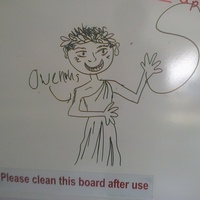
Claire Rachel Jackson
I am currently a postdoctoral researcher for the ERC-funded project 'Novel Echoes', based at Ghent University under the direction of Prof. Koen De Temmerman. My current research looks at the hitherto underexplored early reception history of the ancient novel in late antiquity and Byzantium with particular focus on how novelistic fiction was received and reinterpreted. My research seeks to balance the scanty, often dubious, explicit references to the novel in late antiquity with the richer but more slippery implicit intertextual references which run throughout late antique literature. By collating and analysing these testimonia to the ancient novel in this broad-ranging way, my research hopes to integrate novelistic scholarship with late antique and Byzantine scholarship in a ways rarely seen previously, and to explore how these different receptions of the novels as fictional texts shape and were shaped by their literary contexts.
My PhD 'Fraud, Forgery, and Falsehood: Theories and Practices of Fiction in the Ancient Novel’, awarded by the University of Cambridge in 2017, explored concepts of fiction in the ancient Greek novels. Rather than seeing novelistic fiction as a naturalised part of the still-evolving genre, my research argues that the ancient novelists actively exploited questions about fiction, myth, and history in their works and construct new and innovative approaches to reading fiction which reflect wider political and literary concerns of the imperial period. As such, novelistic fiction becomes a vehicle for contemporary concerns of imperial culture and as such engages with the politics and criticism of the period.
Current interests include Photius' 'Bibliotheca' and its role in transmitting ideas about novelistic fiction, fragmentary novels such as Iamblichus' 'Babyloniaka' and Antonius Diogenes' 'The Wonders Beyond Thule,' and epistolary fiction.
I studied for my BA at the University of Warwick, where I graduated with the highest marks of my entire cohort and completed a dissertation on the Roman novels under the supervision of Prof. Simon Swain. I then moved to the University of Cambridge for my postgraduate studies, completing an MPhil and then a PhD under the supervision of Prof. Simon Goldhill. After graduating in 2017, I worked as a Language Teaching Associate for the Faculty of Classics and a College Teaching Associate and Director of Studies in Classics at Sidney Sussex College (2017-2019). I joined UGent in 2020.
Supervisors: Koen De Temmerman, Simon Goldhill, and Simon Swain
My PhD 'Fraud, Forgery, and Falsehood: Theories and Practices of Fiction in the Ancient Novel’, awarded by the University of Cambridge in 2017, explored concepts of fiction in the ancient Greek novels. Rather than seeing novelistic fiction as a naturalised part of the still-evolving genre, my research argues that the ancient novelists actively exploited questions about fiction, myth, and history in their works and construct new and innovative approaches to reading fiction which reflect wider political and literary concerns of the imperial period. As such, novelistic fiction becomes a vehicle for contemporary concerns of imperial culture and as such engages with the politics and criticism of the period.
Current interests include Photius' 'Bibliotheca' and its role in transmitting ideas about novelistic fiction, fragmentary novels such as Iamblichus' 'Babyloniaka' and Antonius Diogenes' 'The Wonders Beyond Thule,' and epistolary fiction.
I studied for my BA at the University of Warwick, where I graduated with the highest marks of my entire cohort and completed a dissertation on the Roman novels under the supervision of Prof. Simon Swain. I then moved to the University of Cambridge for my postgraduate studies, completing an MPhil and then a PhD under the supervision of Prof. Simon Goldhill. After graduating in 2017, I worked as a Language Teaching Associate for the Faculty of Classics and a College Teaching Associate and Director of Studies in Classics at Sidney Sussex College (2017-2019). I joined UGent in 2020.
Supervisors: Koen De Temmerman, Simon Goldhill, and Simon Swain
less
Related Authors
Noel B. Salazar
KU Leuven
Owen Hodkinson
University of Leeds
Giuseppe Pezzini
University of Oxford
Armando Marques-Guedes
UNL - New University of Lisbon
Giulia Sissa
Ucla
Dylan James
University of Reading
Cara G Tremain
Simon Fraser University
Luca Graverini
University of Siena / Università di Siena
Ivan Ladynin
Moscow State University
Veronique GELY
Sorbonne University
InterestsView All (18)










Uploads
PhD Thesis by Claire Rachel Jackson
Journal Articles by Claire Rachel Jackson
Despite the long debate over whether it was composed in the third or fourth century c.e., Heliodorus's Aithiopika has usually been understood through the imperial literary contexts which characterize earlier novels. This article inverts this perspective to explore instead how the novel fits into contemporary late antique considerations about fiction. By reading the Aithiopika against late-fourth and early-fifth century discussions of falsehood and plausibility found in Augustine and Gregory of Nyssa, this article argues that the Aithiopika not only reworks classical models for reading fiction, but also illuminates late antique concerns about fiction, falsehood, and belief.
Link to full article here: https://muse.jhu.edu/article/790107
Book Chapters by Claire Rachel Jackson
The fragmentary novel of Antonius Diogenes has long been recognised for its fantastical fictions of travel beyond the known world, even as far afield as the Moon itself. The novel, however, is no longer extant and survives primarily in Photius' extensive plot summary in the ninth-century 'Bibliotheca'. What effect does Photius' perspective have on how he describes the novel? Why does Photius go into a disproportionate amount of detail about this novel when others receive a much more cursory and linear summary? This chapter explores Photius' priorities as an editor and compiler, and considers how a concern for authenticity as a literary strategy for reading fiction structures both our reception of the novel and Photius' 'Bibliotheca' more widely.
Book Reviews by Claire Rachel Jackson
The Classical Review 71.1 (2020) 6-9.
The Classical Review 65.2 (2015) 472-4.
Blog Posts by Claire Rachel Jackson
Despite the long debate over whether it was composed in the third or fourth century c.e., Heliodorus's Aithiopika has usually been understood through the imperial literary contexts which characterize earlier novels. This article inverts this perspective to explore instead how the novel fits into contemporary late antique considerations about fiction. By reading the Aithiopika against late-fourth and early-fifth century discussions of falsehood and plausibility found in Augustine and Gregory of Nyssa, this article argues that the Aithiopika not only reworks classical models for reading fiction, but also illuminates late antique concerns about fiction, falsehood, and belief.
Link to full article here: https://muse.jhu.edu/article/790107
The fragmentary novel of Antonius Diogenes has long been recognised for its fantastical fictions of travel beyond the known world, even as far afield as the Moon itself. The novel, however, is no longer extant and survives primarily in Photius' extensive plot summary in the ninth-century 'Bibliotheca'. What effect does Photius' perspective have on how he describes the novel? Why does Photius go into a disproportionate amount of detail about this novel when others receive a much more cursory and linear summary? This chapter explores Photius' priorities as an editor and compiler, and considers how a concern for authenticity as a literary strategy for reading fiction structures both our reception of the novel and Photius' 'Bibliotheca' more widely.
The Classical Review 71.1 (2020) 6-9.
The Classical Review 65.2 (2015) 472-4.